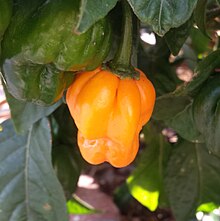Scotch bonnet
This article needs additional citations for verification. (August 2015) |
| Scotch bonnet | |
|---|---|
 | |
| Species | Capsicum chinense |
| Cultivar | 'Scotch Bonnet' |
| Heat | |
| Scoville scale | 100,000-350,000 SHU |
Scotch bonnet (also known as Bonney peppers, or Caribbean red peppers)[1] is a variety of chili pepper named for its supposed resemblance to a Scottish tam o' shanter bonnet.[2][3] It is ubiquitous in West Africa and the Caribbean.
Like the closely related habanero, Scotch bonnets have a heat rating of 100,000–350,000 Scoville units.[4] For comparison, most jalapeño peppers have a heat rating of 2,500 to 8,000. A completely sweet variety of Scotch bonnet, cachucha, is grown on some Caribbean islands.[citation needed]
Cuisine
Scotch bonnets are used to flavor many dishes and cuisines worldwide and are often used in hot sauces and condiments. The Scotch bonnet has a sweeter flavor and stouter shape, distinct from its habanero relative with which it is often confused.[citation needed]
Scotch bonnets are mostly used in West Africa, West Indian, Sri Lankan, and Maldivian cuisines and pepper sauces, though they often appear in other Caribbean recipes.[citation needed] Scotch bonnets are used in jerk cooking.[5] They are also used in Nicaragua, Costa Rica and Panama for Caribbean-styled recipes such as rice and peas, rondón, saus, beef patties, and ceviche.[citation needed]
-
Scotch bonnet peppers in a Caribbean market
-
A single ripe Scotch bonnet pepper
See also
References
- ^ "Chili Peppers Recipes".
- ^ DeWitt, Dave (1996). Pepper Profile: Scotch Bonnet. Fiery-Foods.com.
- ^ Andrews, Jean (1998). The Pepper Lady's Pocket Pepper Primer. University of Texas Press. p. 147. ISBN 978-0-292-70483-1.
- ^ "Hot Chili Peppers on the Scoville Scale: Measuring chili pepper heat in Scoville units". The Spruce Eats. The Spruce. Archived from the original on 29 May 2018. Retrieved 2008-08-21.
- ^ Cloake, Felicity (2012-07-11). "How to cook perfect jerk chicken". The Guardian. ISSN 0261-3077. Retrieved 2024-01-05.
External links
 Media related to Scotch Bonnet at Wikimedia Commons
Media related to Scotch Bonnet at Wikimedia Commons


